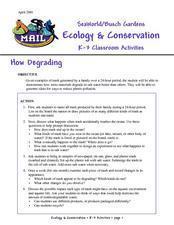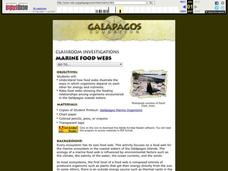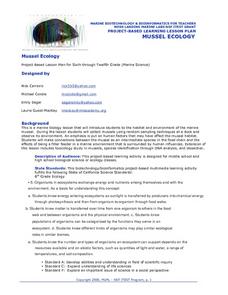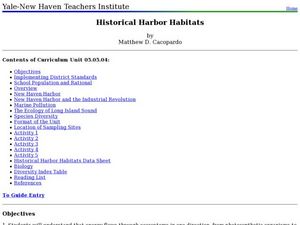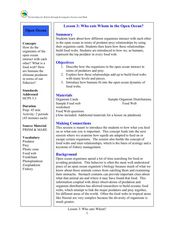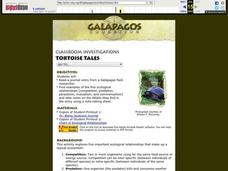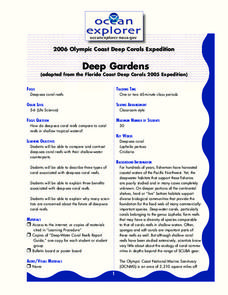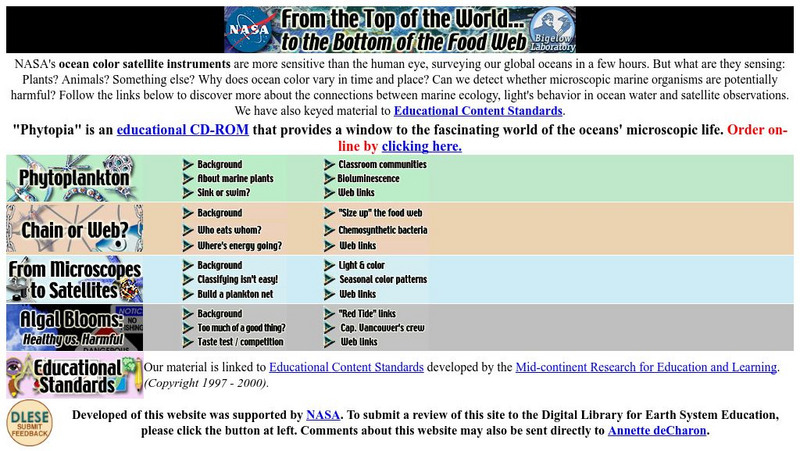Curated OER
Marine Life Research and Persuasive Conservation Pamphlet
Tenth graders examine conservation and research a type of fish that is under environmental stress. For this conservation lesson students create a pamphlet about the conservation of a marine organism.
SeaWorld
Ecology & Conservation
How much trash does an average family produce in 24 hours? Where does that trash end up? Get your youngsters thinking about ecology and conservation as they discuss the impact pollution has on the marine environment. After a deep...
Curated OER
Marine Food Webs
Learners examine how food webs illustrate the ways in which organisms depend on each other for energy and nutrients, and make food webs showing the feeding relationships among organisms encountered in the Gal??pagos coastal waters.
Curated OER
Mussel Ecology
Students are introduced to the marine environment of the mussel. The emphasis of the lesson is upon what human factors are present to influence the environment in positive and negative ways. They brainstorm in groups in order to conduct...
Curated OER
Historical Harbor Habitats
Tenth graders create food web displays in the classroom. In this ecology lesson, 10th graders identify the different pollutants in the environment and their effect on organisms. They collect samples of sediments from the harbor and...
Curated OER
The MPA “GamePlan”
Eighth graders explore the purpose of having Marine Protected Areas. In this environmental science lesson, 8th graders simulate the planning process by playing a board game. They explain the positive and negative effects of trade offs.
Curated OER
Who Eats Whom in the Open Ocean?
Learners examine how organisms interact with one another in the ocean. In this science lesson plan, students discuss predators and prey in the ocean. Learners discuss food webs and how organisms interact with each other.
Curated OER
Blue Planet: Open Ocean
Students research facts about animal species. In this ocean lesson students view a video, prepare illustrated cards and create a food-web display.
Curated OER
Seas Of Life
Young scholars brainstorm examples of predator and prey that are featured in a video they watch. For this investigative lesson students will research an animal from the video and explain if it is a predator or prey and how it helps...
Ocean Explorer
Living with the Heat
Young oceanographers study the Submarine Ring of Fire, which is a series of deep-water volcanic vents that come up from the ocean floor. Learners take a close look at the unique ecosystems that are associated with these areas, how these...
Global Change
Impact of a Changing Climate on the Pacific Walrus
How many of us can say they've seen a Pacific walrus? Not many and one of the reasons is the impact of climate change on their aquatic environment. Children get to think about the food web of the Bering Sea by creating an actual web with...
Curated OER
Introduction to Ocean Grazers
Students explore biology by creating a poster with classmates. In this oceanography lesson, students identify the importance of coral reefs to the ocean's ecology and examine a food web of ocean animals. Students define a list of...
Curated OER
Where's Dinner?
Upcoming marine biologists consider a list of organisms residing near the Lost City hydrothermal vents and construct a food web. They compare the food web to that of a cold seep community, of which they should have previous knowledge....
Curated OER
Coral Reefs Endangered
Learners research where in the world coral reefs are located. For this ecology lesson, students create food chains and food web. They simulate growing coral reefs to understand their characteristics better.
Curated OER
Tortoise Tales
Students read journal entry from a Gal??pagos field researcher, find examples of five ecological relationships (competition, predation, parasitism, mutualism, and commensalism) and take notes on the details they find in the entry using a...
Curated OER
Tracking Ocean Ecology
Students look at the data maps given to them about how chlorophyll affects the algae blooms and make predictions about the harm they will cause. For this data maps lesson plan, students manipulate data sets from the website.
Michigan Sea Grant
Invasive Species
Learners identify invasive species to the Great Lakes and analyze their impact on the ecosystem. Using photo cards with pictures and facts, young scientists work in small groups to match invasive species with their corresponding...
Curated OER
WET Science Lesson #11: How Light Affects Water
Scientists listen to the story of Wadja Egnankou who works to save African mangrove forests. They experiment with refraction and the introduction of particulate matter to water. They conclude with creative writing about the need for a...
Curated OER
Estuaries, Estuarine Habitats, and Adaptations
Students conduct research on estuaries. They design and construct an estuary, describe the physical characteristics of an estuary, and create a diagram illustrating an estuarine food web.
Curated OER
Just Jelly
Students identify common gelatinous zooplankton in the Canada Basin and their ecological role. They compare and contrast feeding strategies of at least three different types of gelatinous zooplankton.
Curated OER
Deep Gardens
Young scholars investigate the differences and similarities between shallow-water and deep-sea coral reefs. In this coral reef lesson, students research and compare the characteristics of reefs. Young scholars describe...
Curated OER
Treasures in Jeopardy
Students study how coral reefs can be protected from humans and their activities. In this conservation activity students explain the benefits of coral reefs and what humans can do to help protect them.
Curated OER
Primary Producers
Students examine the role of carbon in the oceans and how phytoplankton determine the levels present. In groups, they practice measuring primary productivity using two methods. They use the internet to research the role of phytoplankton...
Other
Nasa: From the Top of the World to the Bottom of the Food Web
Teachers and students discover linkages among marine ecology, phytoplankton, the behavior of light at the ocean surface, and satellite-derived ocean color data. Explore the topics of phytoplankton, food webs, and algal blooms using...

